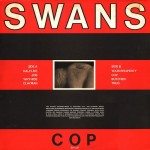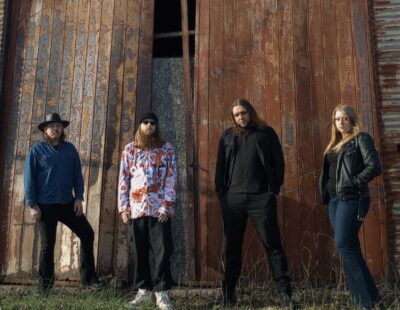In case you haven’t noticed, a third of 2012 has somehow already come and gone. Not only has this year already seen a bunch of great records hit shelves, but there are plenty more on the horizon. And what better way to kick off the remaining 66.7% of 2k12 than with Tuesday’s release of the new Horseback album, which earned Brent Burton’s praise in our June issue.
Coming on the heels of 2009’s Invisible Mountain and 2010’s Forbidden Planet (a cassette only release that, along with 2007’s Impale Golden Horn, Relapse repackaged last year as The Gorgon Tongue), Half Blood is another masterful creation from the mind of Jenks Miller. In fact, we were so curious as to what went into his latest batch of stylistic stew that we asked the North Carolinian to tell us about some of the various ingredients he used along the way. The result—seven tracks from seven albums that influenced the making of Half Blood—also allowed us to avoid having to use meaningless terminology to describe what one of our favorite records of the year so far (okay, well at least one of mine) sounds like. As usual, we’ve compiled Jenks’ picks into a Spotify playlist for your listening enjoyment.
Swans—”Half Life” (from 1984’s Cop)
Cop is rivaled only by their own Public Castration Is A Good Idea and maybe Khanate’s first record in terms of dread-inducing, existential heaviness. Churning, repetitive, confrontational depravity that drags you far nearer to god than is comfortable. We played with Swans at Lexington’s Boomslang Festival last year, which was a real treat. Some chucklefuck in the crowd yelled “boring” as they slowly droned to life, then they flattened him. Oops! “Learn from experience.”

Darkthrone—”Kathaarian Life Code” (from 1992’s A Blaze In The Northern Sky)
This song is a great example of the otherworldly, magical quality I look for in black metal. My favorite records are like self-contained sonic worlds—they drop you in the middle of a strange landscape and it’s up to you to find your way around. The lesson I’ve drawn from these records is to favor atmosphere over technicality when recording. Riffs become secondary to the way they’re delivered and how they’re produced. (Beherit’s Drawing Down The Moon is another example of atmosphere done right.)

Current 93—”All The World Makes Great Blood” (from 1994’s Of Ruine Or Some Blazing Starre)
The World Serpent family—including Current, Coil and Nurse With Wound—changed what I wanted out of music. After discovering this stuff, I became less interested in catchy melodies and technical performances. I started listening more to the way sounds were manipulated in the studio. On Current’s records, electronics often appear as an interference, like a tear in some celestial veil that spills one universe into another.

Junior Kimbrough—”You Better Run” (from 1992’s All Night Long)
Lyrically, this song is really harrowing stuff. It’s also a great example of circular riffing patterns in blues music; short melodic phrases step out from the cycle to provide variation. That’s the sort of motion I try to achieve in many of Horseback’s rock songs. Kimbrough’s band had an uncanny, rhythmically hypnotic quality. Somehow even his “wrong” notes work.

Lungfish—”Sphere of Influence” (from 1996’s Sound In Time)
More circular riffing. Every note matters. The rhythmic center shifts through repetition until you’re hearing the riffs inside-out and backwards. My favorite “indie” band.

Daniel Menche—”Untitled” (track 1) (from 2006’s Creatures Of Cadence)
Jon Mueller—”Hearts” (from 2010’s The Whole)
Both Daniel Menche and Jon Mueller are masterful in their use of rhythm instruments for texture, which is something I attempted in parts of Half Blood and want to explore more explicitly in the future. This Mueller track from The Whole is a bit different from his other stuff. Records like Alphabet of Movements are more abstract, exploiting the physical properties of drums and raw sound waves. At the Utech Records Music Festival in 2011, Mueller played a set with James Plotkin where they routed computer-processed sound through high-volume amplifiers that were arranged to vibrate snares sitting atop their speaker cones. I really dig that kind of thing. It reminds me of sculpture.


*Pick up a copy of Half Blood here!
**We update one Spotify playlist for each new Decibrity entry, so feel free to subscribe to that here. Past entries include:
Greg Mackintosh (Paradise Lost) (Part 1) (Part 2)
Torche
“Best of” Meshuggah
Astra
Pallbearer
Barren Earth
Shane Embury (Napalm Death) (Part 1) (Part 2)





